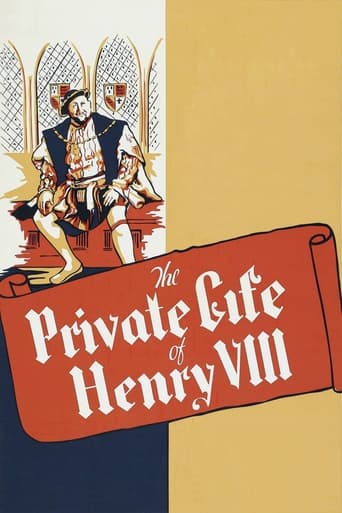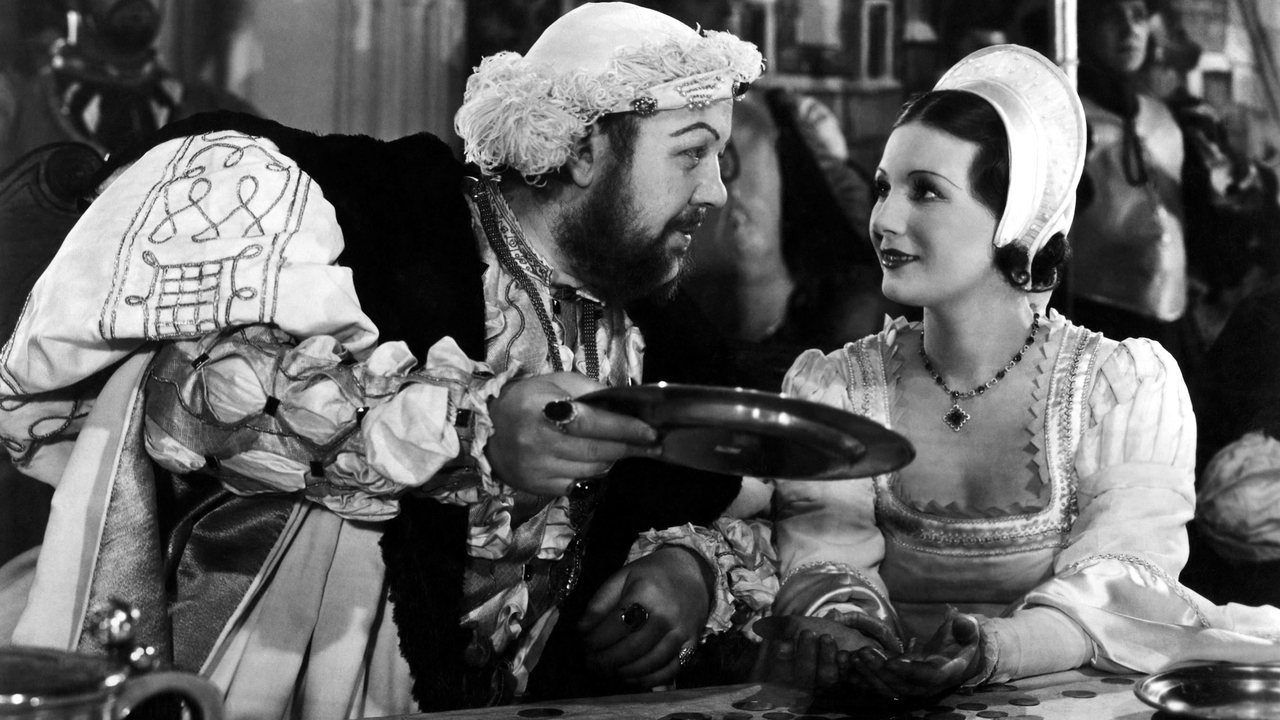Martin Bradley
I don't suppose "The Private Life of Henry VIII" is anymore historically accurate than any of the films that followed it but it's almost certainly the most entertaining. It's played for comedy and it works beautifully thanks to the direction of Alexander Korda, the terrifically witty script of Lajos Biro and Arthur Wimperis and above all to the magnificent performance of Charles Laughton as Henry, (he won the Oscar for it and deservedly so). For starters he looks the part, dressed to the nines to resemble Holbein's famous portrait and visually, though shot in black and white by Georges Perinal, it remains a splendid looking picture. The wives aren't around long enough to make much of an impression but Elsa Lanchester gives her real-life husband a run for his money (literally) as Anne of Cleves. Their wedding night scene is a masterclass in comic acting. It also fairly zips along at just over ninety minutes and over eighty years after it first appeared it remains something of a treat.
JohnHowardReid
Copyright 3 November 1933 by United Artists Corp. Made by London Film Productions, England. New York opening at the Radio City Music Hall, 12 October 1933 (ran one week). London opening: 17 August 1933. U.K. release: 24 October 1933. 96 minutes.SYNOPSIS: King Henry VIII and five of his six wives.NOTES: Academy Award, Best Actor, Charles Laughton (defeating Leslie Howard in Berkeley Square and Paul Muni in I Am A Fugitive from a Chain Gang). Also nominated for Best Picture (Cavalcade). Number 3 on The Film Daily's annual poll of U.S. film critics (Cavalcade was first, 42nd Street second).Photographed at British and Dominion Studios. Shooting commenced late Spring 1933 and was completed in five weeks for a negative cost of Sixty Thousand Pounds. The film was a huge success world-wide, earning gross rentals in excess of Five Hundred Thousand Pounds on its first release. It was never withdrawn from circulation until the advent of television.COMMENT: Considering the enormous — indeed the super-star — popularity of Charles Laughton, it's peculiar that so few of his movies are aired on TV. Most viewers have seen The Sign of the Cross (1932), Jamaica Inn (1939), The Tuttles of Tahiti (1942), The Paradine Case (1948), The Big Clock (1948), Hobson's Choice (1954) and Witness for the Prosecution (1957) — seven pictures from a total of fifty-two. Many of Laughton's most famous movies have never been broadcast at all (Payment Deferred, Island of Lost Souls, White Woman, The Man on the Eiffel Tower) and even Henry VIII has not been seen for many years. This neglect by TV programmers is the more astonishing in view of a survey conducted a few years ago in which readers of a weekly magazine were asked to nominate which movie performance of the past they regarded as unforgettable. Vivien Leigh in GWTW topped the list, followed by Garbo's Camille, Donat's Mr. Chips, Laughton's Henry VIII, Laughton's Captain Bligh in Mutiny on the Bounty, Cagney in Yankee Doodle Dandy, Bogart in Casablanca, Gary Cooper in High Noon, Bergman in Casablanca, Rathbone as Sherlock Holmes. Only Laughton figured on the list twice. In fact, the judge commented that if the performances had been tabulated simply by players and not by films, Laughton was the over-all favorite by a wide margin. His other roles frequently mentioned were in If I Had a Million, The Barretts of Wimpole Street, Ruggles of Red Gap, Les Miserables, Rembrandt and The Hunchback of Notre Dame.Of all these brilliant portrayals, there is no doubt that Henry VIII was the greatest achievement of Laughton's career. He literally sweeps the rest of the characters right off the screen. Only his real-life wife, Elsa Lanchester, can hold up against him. Even Donat (who was later to make such an impression in The Citadel and Goodbye Mr Chips) and Merle Oberon seem pallid and colorless alongside him. True, he is marvelously costumed and made up and better served by the witty script. The director deliberately throws all the attention his way, virtually forcing him to carry the whole film — which he does magnificently. It's an acting tour de force — one of the most memorable impersonations in the entire history of the cinema.
Robert J. Maxwell
Near the beginning of "Three Days of the Condor," Max von Sydow and his gang of hired hit men brutally murder in cold blood half a dozen harmless and unarmed civilians. At the end, von Sydow's character has a little speech that is supposed to make us sympathetic. He may kill for the group that pays him the most, but he is a sensitive man, a man of principle. But that initial mass murder, starkly depicted, is an unforgivable act. It was so repellant that the fact that he might know the Louvre inside and out became irrelevant.I had the same problem with "The Private Life of Henry VIII." Charles Laughton gives a find performance, considering that it's so overplayed. But one expects a great big ham at a royal banquet. The difficulty is that the film begins with the tragic beheading of Anne Bolyne, Henry's second wife. And the preparations are dwelt on. The French headsman, imported for the occasion, spends forever sharpening his sword. There is reassuring talk about how it doesn't hurt. Happily the execution takes place off screen, as does the descending sword in "Anne of the Thousand Days," which tells part of the same story.The king isn't at all put off by his wife's death. She had to make room for wife number three. He goes through half a dozen wives. In the last scene he turns to the camera and says, "Six wives, and the last one is the worst." And we're supposed to chuckle at the bad luck of this pompous, self indulgent, murdering curmudgeon who lives by hypothetical imperatives alone.Laughton's performance can't be criticized. He shouts out orders and bullies everyone, man and woman alike. When he executes another wife for possible adultery, he weeps as he prays for forgiveness, "Mea culpa," but I don't believe it. He's never shown remorse in his life. Yet he injects some humor into the narrative. "There is no more delicacy," he complains at the dinner table, as he tears off a large piece of capon and slips the bones over his shoulder. Laughton has developed a walk that reeks of uncompromising authority, as he stomps around the castle.I guess the contemporary audience enjoyed it. I didn't like it much.
Gloede_The_Saint
This was god damn bleeding great. Both hilarious and sad. With a sarcastic and somewhat sarcastic tone, we see the life of the notorious king and the relationships to his five last wives, the first is left out since she according to the film's opening titles were not interesting enough. : ) What to say about this. Executioners who bicker over who has the right to cut off the head of the Queen (opening scenes), and spectators who wants the best possible view of the execution is the beginning of this wonderful genre mix from Alexander Korda.Charles Laughton plays the crazed Henry, whom despite many ugly acts you just have to love. The rest of the cast is quite good as well, especially Elsa Lanchester, but Laughton is indeed the star. Not a boring, empty, or uninteresting moment.If you have not seen this you most definitely have to! Delicious black humor and some great drama is what awaits you.Rating: 9.5/10


 AD
AD
